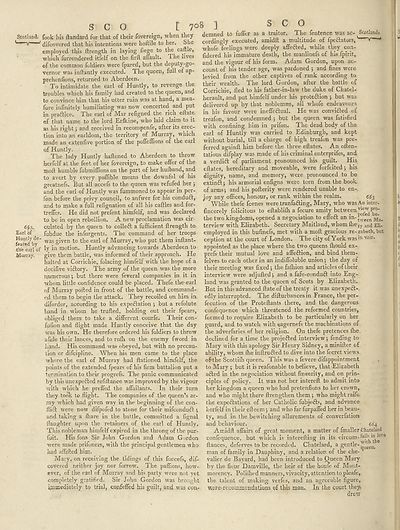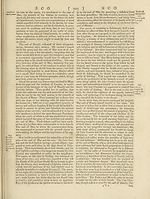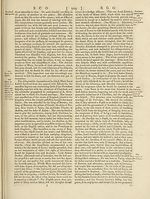Encyclopaedia Britannica, or, a Dictionary of arts, sciences, and miscellaneous literature : enlarged and improved. Illustrated with nearly six hundred engravings > Volume 18, RHI-SCR
(746) Page 708
Download files
Complete book:
Individual page:
Thumbnail gallery: Grid view | List view

SCO t
Scotland. f0ok his ftandard for that of their fovereign, when they
* 1 v difcovered that his intentions were hoftile to her. She
employed this ftrength in laying fiege to the caftle,
which furrendered itfelf on the firll affault. I-lie lives
of the common foldiers were fpared, but the deputy-go¬
vernor was inftantly executed. The queen, full ot ap-
prehenfions, returned to Aberdeen.
To intimidate the earl of Huntly, to revenge the
troubles which his family had created to the queen, and
to convince him that his utter ruin was at hand, a mea-
fure infinitely humiliating was now concerted and put
in praftice. The earl of Mar refigned the rich eftate
of that name to the lord Erfkine, who laid claim to it
as his right; and received in recompenfe, after its erec¬
tion into an earldom, the territory of Murray, which
made an extenfive portion of the poffeflions of the earl
of Huntly.
The lady Huntly haflened to Aberdeen to throw
herfelf at the feet of her fovereign, to make offer of the
moft humble fubmiflions on the part of her hufband, and
to avert by every poflible means the downfal of his
greatnefs. But all accefs to the queen was refufed her $
and the earl of Huntly was fummoned to appear in per-
ibn before the privy council, to anfwer for his conduft,
and to make a full refignation of all his caftles and for-
treffes. He did not prefent himfelf, and was declared
to be in open rebellion. A new proclamation was cir-
culated by the queen to colleft a fufficient ftrength to
Earl of fubdue the infurgents. The command of her troops
feartdtf6" was 8*ven t0 t^e ear^ Murray, who put them inftant-
tfte ear/of ty in motion. Huntly advancing towards Aberdeen to
Murray. give them battle, was informed of their approach. He
halted at Corrichie, folacing himfelf with the hope of a
decifive vidlory. The army of the queen was the more
numerous •, but there were feveral companies in it in
whom little confidence could be placed. Thefe the'earl
of Murray ported in front of the battle, and command¬
ed them to begin the attack. They recoiled on him in
diforder, according to his expectation but a refolute
band in whom he trufted, holding out their fpears,
obliged them to take a different courfe. Their con-
fulion and flight made Huntly conceive that the day
was his own. He therefore ordered his foldiers to throw
afide their lances, and to rufti on the enemy fword in
hand. His command was obeyed, but with no precau¬
tion or difcipline. When his men came to the place
where the earl of Murray had ftationed himfelf, the
points of the extended fpears of his firm battalion put a
termination to their progrefs. The panic communicated
by this unexpected refiftance was improved by the vigour
with which he preffed the afl'ailants. In their turn
they took to flight. The companies of the queen’s ar¬
my which had given way in the beginning of the con¬
flict were now difpofed to atone for their mifconduCt •,
and taking a (hare in the battle, committed a fignal
{laughter upon the retainers of the earl of Huntly.
This nobleman himfelf expired in the throng of the pur-
fuit. His fons Sir John Gordon and Adam Gordon
were made prifoners, with the principal gentlemen who
had aftifted him.
Mary, on receiving the tidings of this fuccefs, dif¬
covered neither joy nor forrow. The paflions, how¬
ever, of the earl of Murray and his party were not yet
completely gratified. Sir John Gordon was brought
ynuaediately to trial, c.onfeffed his guilt, and was con-
7o8 ] SCO
demned to fuffer as a traitor. The fentence was ac- Scotland*
cordingly executed, amidft a multitude of fpeClators,
whofe feelings were deeply affeCted, while they con-
fidered his immature death, the manlinefs of his fpirit,
and the vigour of his form. Adam Gordon, upon ac¬
count of his tender age, was pardoned ; and fines were
levied from the other captives of rank according to
their wealth. The lord Gordon, after the battle of
Corrichie, fled to his father-in-law the duke of Chatel-
herault, and put himfelf under his protedion j but was
delivered up by that nobleman, all whofe endeavours
in his favour were ineffectual. He was conviCled of
treafon, and condemned ; but the queen was fatisfied
with confining him in prifon. The dead body of the
earl of Huntly was carried to Edinburgh, and kept
without burial, till a charge of high treafon was pre¬
ferred again!! him before the three eftates. An often-
tatious difplay was made of his criminal enterprifes, and
a verdiC! of parliament pronounced his guilt. His
eftates, hereditary and moveable, were forfeited j his
dignity, name, and memory, were pronounced to be
extinClj his armorial enfigns were torn from the book
of armsj and his pofterity were rendered unable to en¬
joy any ofHces, honour, or rank within the realm. 665
While thefe fcenes were tranfaCling, Mary, who was An inter-
fincerely felicitous to eftablifti a fecure amity between
the two kingdoms, opened a negociation to effeCl an in- ^
terview with Elizabeth. Secretary Maitland, whom ftiery and Eli-
employed in this bufinefs, met with a moft gracious re- zabeth, but
ception at the court of London. The city of York wasm vain-
appointed as the place where the two queens ftiould ex-
prefs their mutual love and affeCfion, and bind them-
felves to each other in an indiffoluble union; the day of
their meeting was fixed; the fafhion and articles of their
interview were adjufted; and a fafe-conduCt into Eng¬
land was granted to the queen of Scots by Elizabeth.
But in this advanced ftate of the treaty it was unexpect¬
edly interrupted. The difturbances in France, the per¬
fection of the Proteftants there, and the dangerous
confequence which threatened the reformed countries,
feemed to require Elizabeth to be particularly on her
guard, and to watch with yagernefs the machinations of
the adverfaries of her religion. On thefe pretences the
declined for a time the projefted interview j fending to
Mary with this apology Sir Henry Sidney, a minifter of
ability, whom !he inftrudled to dive into the fecret views
of the Scottifli queen. This was a fevere difappointment
to Mary ; but it is reafonable to believe, that Elizabeth
a£fed in the negociation without fineerity, and on prin¬
ciples of policy. It was not her intereft to admit into
her kingdom a queen who had pretenfions to her crown,
and who might there ftrengthen them ; who might raife
the expectations of her Catholic fubjeCls, and advance
kerfelf in their efteem; and who far furpaffed her in beau¬
ty, and in the bewitching allurements of converfation
and behaviour. 664
Amidft affairs of great moment, a matter of fmaller Chatelard
confequence, but which is interefting in its circum-fafl^^ova
fiances, deferves to be recorded. Chatelard, a gentle-
man of family in Dauphiny, and a relation of the che¬
valier de Bayard, had been introduced to (^ueen Mary
by the fieur Damville, the heir of the houfe of Mont¬
morency. Poliftied manners, vivacity, attention to pleafe,
the talent of making verfes, and an agreeable figure,
were-recommendations of this man. In the court they,
drew
Scotland. f0ok his ftandard for that of their fovereign, when they
* 1 v difcovered that his intentions were hoftile to her. She
employed this ftrength in laying fiege to the caftle,
which furrendered itfelf on the firll affault. I-lie lives
of the common foldiers were fpared, but the deputy-go¬
vernor was inftantly executed. The queen, full ot ap-
prehenfions, returned to Aberdeen.
To intimidate the earl of Huntly, to revenge the
troubles which his family had created to the queen, and
to convince him that his utter ruin was at hand, a mea-
fure infinitely humiliating was now concerted and put
in praftice. The earl of Mar refigned the rich eftate
of that name to the lord Erfkine, who laid claim to it
as his right; and received in recompenfe, after its erec¬
tion into an earldom, the territory of Murray, which
made an extenfive portion of the poffeflions of the earl
of Huntly.
The lady Huntly haflened to Aberdeen to throw
herfelf at the feet of her fovereign, to make offer of the
moft humble fubmiflions on the part of her hufband, and
to avert by every poflible means the downfal of his
greatnefs. But all accefs to the queen was refufed her $
and the earl of Huntly was fummoned to appear in per-
ibn before the privy council, to anfwer for his conduft,
and to make a full refignation of all his caftles and for-
treffes. He did not prefent himfelf, and was declared
to be in open rebellion. A new proclamation was cir-
culated by the queen to colleft a fufficient ftrength to
Earl of fubdue the infurgents. The command of her troops
feartdtf6" was 8*ven t0 t^e ear^ Murray, who put them inftant-
tfte ear/of ty in motion. Huntly advancing towards Aberdeen to
Murray. give them battle, was informed of their approach. He
halted at Corrichie, folacing himfelf with the hope of a
decifive vidlory. The army of the queen was the more
numerous •, but there were feveral companies in it in
whom little confidence could be placed. Thefe the'earl
of Murray ported in front of the battle, and command¬
ed them to begin the attack. They recoiled on him in
diforder, according to his expectation but a refolute
band in whom he trufted, holding out their fpears,
obliged them to take a different courfe. Their con-
fulion and flight made Huntly conceive that the day
was his own. He therefore ordered his foldiers to throw
afide their lances, and to rufti on the enemy fword in
hand. His command was obeyed, but with no precau¬
tion or difcipline. When his men came to the place
where the earl of Murray had ftationed himfelf, the
points of the extended fpears of his firm battalion put a
termination to their progrefs. The panic communicated
by this unexpected refiftance was improved by the vigour
with which he preffed the afl'ailants. In their turn
they took to flight. The companies of the queen’s ar¬
my which had given way in the beginning of the con¬
flict were now difpofed to atone for their mifconduCt •,
and taking a (hare in the battle, committed a fignal
{laughter upon the retainers of the earl of Huntly.
This nobleman himfelf expired in the throng of the pur-
fuit. His fons Sir John Gordon and Adam Gordon
were made prifoners, with the principal gentlemen who
had aftifted him.
Mary, on receiving the tidings of this fuccefs, dif¬
covered neither joy nor forrow. The paflions, how¬
ever, of the earl of Murray and his party were not yet
completely gratified. Sir John Gordon was brought
ynuaediately to trial, c.onfeffed his guilt, and was con-
7o8 ] SCO
demned to fuffer as a traitor. The fentence was ac- Scotland*
cordingly executed, amidft a multitude of fpeClators,
whofe feelings were deeply affeCted, while they con-
fidered his immature death, the manlinefs of his fpirit,
and the vigour of his form. Adam Gordon, upon ac¬
count of his tender age, was pardoned ; and fines were
levied from the other captives of rank according to
their wealth. The lord Gordon, after the battle of
Corrichie, fled to his father-in-law the duke of Chatel-
herault, and put himfelf under his protedion j but was
delivered up by that nobleman, all whofe endeavours
in his favour were ineffectual. He was conviCled of
treafon, and condemned ; but the queen was fatisfied
with confining him in prifon. The dead body of the
earl of Huntly was carried to Edinburgh, and kept
without burial, till a charge of high treafon was pre¬
ferred again!! him before the three eftates. An often-
tatious difplay was made of his criminal enterprifes, and
a verdiC! of parliament pronounced his guilt. His
eftates, hereditary and moveable, were forfeited j his
dignity, name, and memory, were pronounced to be
extinClj his armorial enfigns were torn from the book
of armsj and his pofterity were rendered unable to en¬
joy any ofHces, honour, or rank within the realm. 665
While thefe fcenes were tranfaCling, Mary, who was An inter-
fincerely felicitous to eftablifti a fecure amity between
the two kingdoms, opened a negociation to effeCl an in- ^
terview with Elizabeth. Secretary Maitland, whom ftiery and Eli-
employed in this bufinefs, met with a moft gracious re- zabeth, but
ception at the court of London. The city of York wasm vain-
appointed as the place where the two queens ftiould ex-
prefs their mutual love and affeCfion, and bind them-
felves to each other in an indiffoluble union; the day of
their meeting was fixed; the fafhion and articles of their
interview were adjufted; and a fafe-conduCt into Eng¬
land was granted to the queen of Scots by Elizabeth.
But in this advanced ftate of the treaty it was unexpect¬
edly interrupted. The difturbances in France, the per¬
fection of the Proteftants there, and the dangerous
confequence which threatened the reformed countries,
feemed to require Elizabeth to be particularly on her
guard, and to watch with yagernefs the machinations of
the adverfaries of her religion. On thefe pretences the
declined for a time the projefted interview j fending to
Mary with this apology Sir Henry Sidney, a minifter of
ability, whom !he inftrudled to dive into the fecret views
of the Scottifli queen. This was a fevere difappointment
to Mary ; but it is reafonable to believe, that Elizabeth
a£fed in the negociation without fineerity, and on prin¬
ciples of policy. It was not her intereft to admit into
her kingdom a queen who had pretenfions to her crown,
and who might there ftrengthen them ; who might raife
the expectations of her Catholic fubjeCls, and advance
kerfelf in their efteem; and who far furpaffed her in beau¬
ty, and in the bewitching allurements of converfation
and behaviour. 664
Amidft affairs of great moment, a matter of fmaller Chatelard
confequence, but which is interefting in its circum-fafl^^ova
fiances, deferves to be recorded. Chatelard, a gentle-
man of family in Dauphiny, and a relation of the che¬
valier de Bayard, had been introduced to (^ueen Mary
by the fieur Damville, the heir of the houfe of Mont¬
morency. Poliftied manners, vivacity, attention to pleafe,
the talent of making verfes, and an agreeable figure,
were-recommendations of this man. In the court they,
drew
Set display mode to:
![]() Universal Viewer |
Universal Viewer | ![]() Mirador |
Large image | Transcription
Mirador |
Large image | Transcription
Images and transcriptions on this page, including medium image downloads, may be used under the Creative Commons Attribution 4.0 International Licence unless otherwise stated. ![]()
| Permanent URL | https://digital.nls.uk/193028405 |
|---|
| Attribution and copyright: |
|
|---|
| Description | Ten editions of 'Encyclopaedia Britannica', issued from 1768-1903, in 231 volumes. Originally issued in 100 weekly parts (3 volumes) between 1768 and 1771 by publishers: Colin Macfarquhar and Andrew Bell (Edinburgh); editor: William Smellie: engraver: Andrew Bell. Expanded editions in the 19th century featured more volumes and contributions from leading experts in their fields. Managed and published in Edinburgh up to the 9th edition (25 volumes, from 1875-1889); the 10th edition (1902-1903) re-issued the 9th edition, with 11 supplementary volumes. |
|---|---|
| Additional NLS resources: |
|

